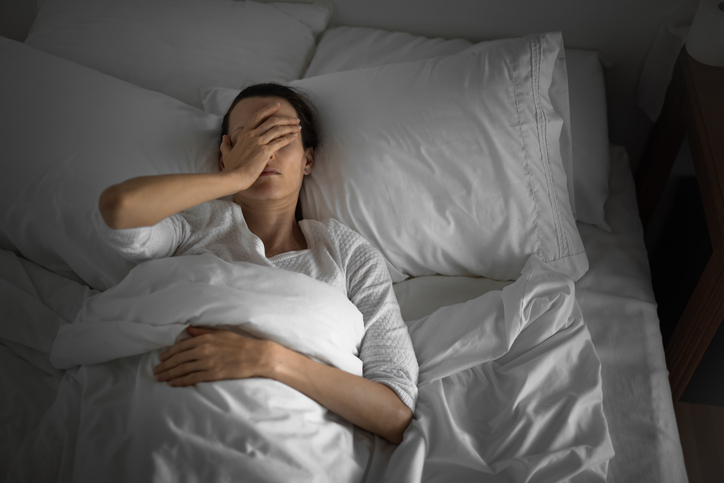Good Sleep Habits
There are some things that can help your sleep, and definitely others that don’t, so establishing a good sleep routine is really important.

We can all have trouble sleeping from time to time, but there are some simple things that could make a difference and I hope that these will help you.
Repay your sleep debt
The lack of enough sleep over time can result in a sleep debt. This is the difference between the amount of sleep you need and the amount you actually get.
This debt can be repaid by tacking on extra snooze time each night until you feel caught up.
Or if that doesn’t work for you, and there are conflicting views about whether it helps or not, an afternoon siesta of no more than two hours maximum, could also work – I know it does for me.
Exercise can make a difference
Regular exercise can help you sleep better. For best results, exercise before dinner, not later.
But don’t rev up with exercise near bedtime.
In the evening, light yoga or stretches can help you wind down. If you have a medical problem or are over 50 check with your doctor before starting an exercise routine.
Choose night time snacks wisely
An oatmeal raisin cookie and a glass of milk can help you fall asleep. That’s because this snack includes complex carbs that likely increase levels of sleep-inducing amino acid tryptophan.
Bananas can also potentially help with your sleep due to their nutrient content of magnesium, potassium, tryptophan and vitamin B6.
These nutrients can promote relaxation, muscle relaxation, and help regulate the sleep-wake cycle. Other sleep-boosting choices: a piece of whole grain toast or a small bowl of cereal.
Create a sleep schedule
The average person needs 7-9 hours of sleep per night. Most experts recommend maintaining a consistent sleep schedule even on days when you are able to sleep in.
This balances your internal clock, allowing you to stay awake when needed and fall asleep when ready.
It helps if your bedroom is conducive to sleep: dark, cool, and quiet.
Wind down your brain
Try blocking out a daily “worry time” to get anxiety out of your system before bed. Make time just after dinner to plan your next day, catch up on email, and tie up loose ends.
Then you can have time before bed to let go of anxieties and relax.
To nap – or not?
Whether you should nap during the day depends on how you normally sleep at night. If you typically sleep well, then an occasional short nap is OK.
Naps can make you function better, lower blood pressure, and maybe even help you live longer. Avoid napping too late in the day, as it might affect your nighttime sleep.
But if you have sleep problems, naps may be helpful – or make your night time sleep worse. It’s going to have to be an experiment to find out what works for you.
Sleep saboteurs
Caffeine can perk you up so avoid it after lunch if you have trouble sleeping at night. It can stay in your system for an average of three to five hours, but some people are affected as long as 12 hours.
Watch your afternoon food and drink choices. Caffeine may hide in soft drinks, tea, and chocolate. Also be wary of certain medications, such as decongestants, which can aggravate sleep problems.
Is pain the problem?
Are aches and pains keeping you up at night? You’re not alone: According to one survey, three-quarters of people with low back pain experienced poor sleep. And if you can’t sleep well, you may feel even worse during the day.
First, make sure you practice good sleep hygiene. You may want to consider occasionally taking an over the counter pain reliever to help you doze off.
But this is only for occasional use, if you are regularly experiencing pain that keeps you awake please do consult your doctor.
Natural helpers
Bioidentical progesterone is known to have a relaxing effect to help with sleep and helpful for many at menopause when anxiety levels can rise.
Plus there are many natural options that have been in use for thousands of years such as herbal teas like chamomile or valerian or supplements such as magnesium, tryptophan and melatonin that may help relax you for sleep.
Or try aromatherapy oils as studies have found that lavender produces slight relaxing and calming effects. It is available in many forms, as an oil to rub on your wrists or put in a bath, or a spray to spritz your pillow.
Try visualisation
In the late evening, visualise something calming, using all your senses to make the image as vivid as possible.
Or try progressive muscle relaxation. Tighten up the muscles in your toes for several seconds. Then relax them for 30 seconds. Focus on how relaxed they feel. Repeat this all the way up your body, ending at your neck and face.
Personally, I find music very helpful in calming the mind and helping me sleep if I’ve had “one of those days”.
Natural sleep aids
If you are low in progesterone, then supplement with this as this hormone has been known to help sleep as it is a natural relaxant.
Other tried and trusted methods that have been in use for thousands of years are herbs such as chamomile, valerian and passionflower.
Other frequently recommended sleep elements are tryptophan, magnesium and melatonin.
Or try aromatherapy as studies have found that lavender produces slight relaxing and calming effects. You can apply it as an oil to the wrists or in your bath, or as a spray for your pillow. when inhaled.
Helpful information:
Unfortunately at Menopause, or when having hormonal symptoms, sleep can often be elusive.
It does not matter if it is night sweats, hot flushes or too frequent trips to the bathroom there are some habits that will definitely make your sleep worse.
One solution is using bioidentical progesterone cream together with a specifically formulated herbal compound that facilitates a good nights rest.
If you still need some more help, then this excellent article by Nutrition expert Patrick Holford can do that.
https://anna.blog.wellsprings-health.com/the-complete-guide-to-a-good-nights-sleep/



















